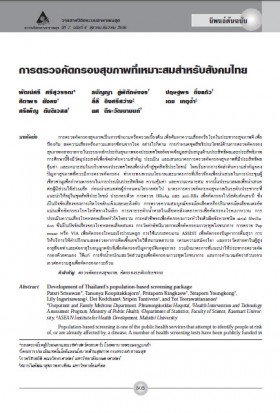Abstract
Development of Thailand’s population-based screening package
Patsri Srisuwan*, Tanunya Koopitakkajorn†, Pritaporn Kingkaew†, Sitaporn Youngkong†,
Lily Ingsrisawang‡, Det Kedcham§, Sripen Tantivess†, and Yot Teerawattananon†
*Outpatient and Family Medicine Department, Phramongkutklao Hospital, †Health Intervention and Technology
Assessment Program, Ministry of Public Health, ‡Department of Statistics, Faculty of Science, Kasetsart University,
§ASEAN Institute for Health Development, Mahidol University
Population-based screening is one of the public health services that attempt to identify people at risk
of, or are already affected by, a disease. A number of health screening tests have been publicly funded in
Thailand without rigorous assessment of scientific evidence. This study aims to develop an appropriate
population-based screening package in Thailand through a transparent, systematic, and participatory
process. Health problems were prioritized through a consultation meeting among stakeholders and reviewed
for their screening tools. The results were appraised and deliberated for consensus. The final
recommendations for appropriate population-based screening package include screening hepatitis B surface
antigen (HBsAg) and hepatitis B surface antibody (anti-HBs) for hepatitis B virus infection; complete
blood count (CBC) or hematocrit level (Hct) for anemia in infants; fasting plasma glucose for diabetes;
global risk scores for coronary heart diseases; pulse palpitation for atrial fibrillation; body mass index for
malnutrition; Pap smear or VIA for cervical cancer; ASSIST for alcohol dependence; provider-initiated
voluntary counseling and testing for HIV infection; and visual acuity for traffic accident. Two screening
tests were recommended for self-examination: measurement of weight and height for malnutrition; and
calculation of waist-to-height ratio for obesity.





